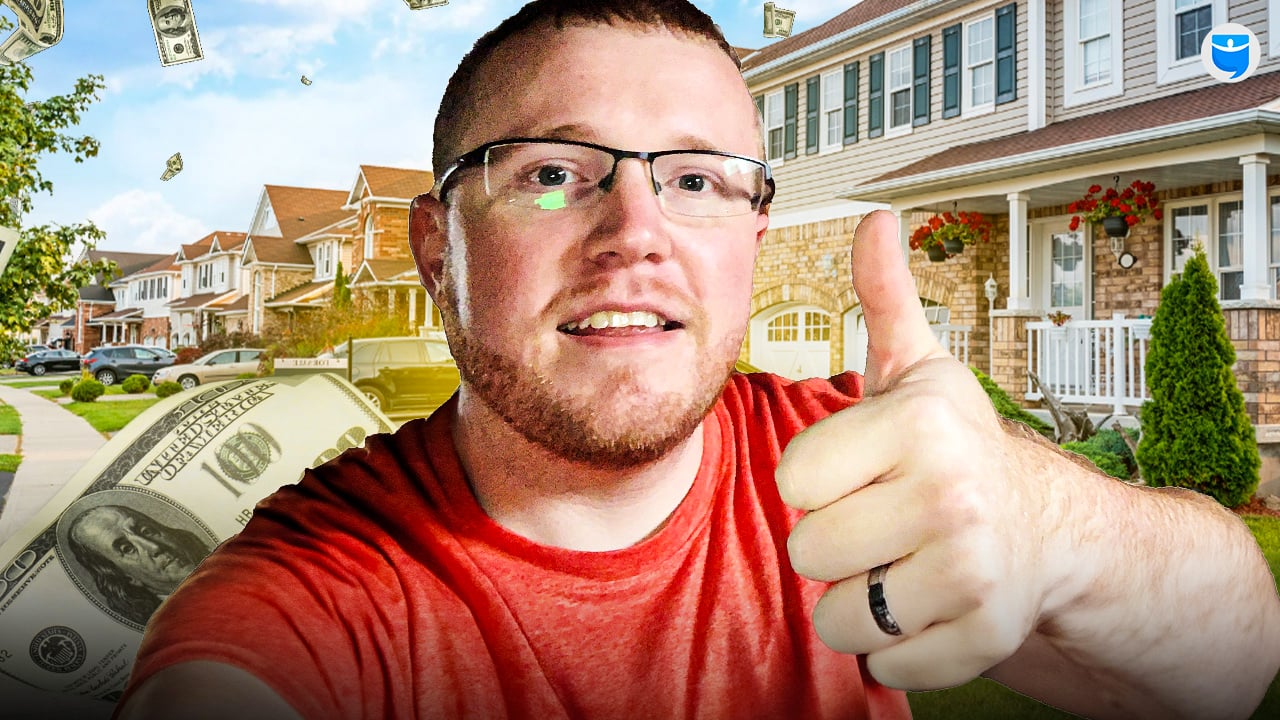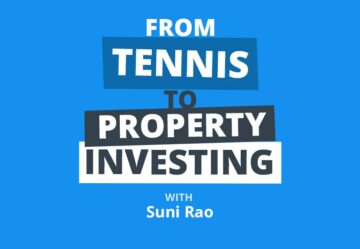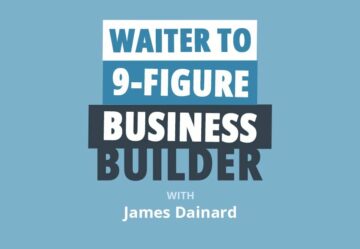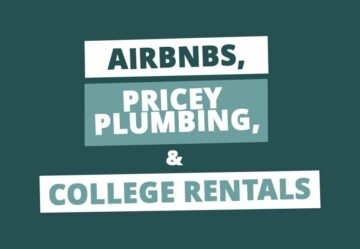
There’s one type of investment property most people would NEVER consider that could make you a millionaire. They’re not regular rental properties or huge apartment complexes—in fact, they’re so cheap that most investors could probably buy them outright in cash. What’s this “overlooked” investment property that could make you millions? Stick around, we’ll tell you.
Four years ago, Jason Velie worked at a W2 job without any investment property or passive income. Now, he’s a multimillionaire, making $10,000/month in pure cash flow, NEVER having to wake up to an alarm clock again. After a first deal gone wrong, where Jason spent two years working on a house just to break even, he was introduced to a new type of investment property—one nobody talks about.
With the massive profits from these cash cow deals, Jason was then able to use just $15,000 to buy a property that is now worth $1,000,000. And this was ALL during one of the hottest real estate markets ever. The best part? You can do EXACTLY what Jason did to become a millionaire, too, so stick around to hear his FULL strategy!
Click here to listen on Apple Podcasts.
Listen to the Podcast Here
Read the Transcript Here
David:
This is the BiggerPockets podcast show 851. What’s going on everyone? This is David Greene, your host of the BiggerPockets Real Estate Podcast, the number one real estate podcast in the world. Each week we bring you the knowledge, how-tos, and the market insights that you need to make the best possible financial decisions you can in order to improve your financial position and build the life that you’ve always wanted. In today’s show, Rob and I are interviewing Jason Velie who built a portfolio that now pulls in six figures a year. By investing in an often overlooked asset class, Jason was able to leave his W-2 job this year after replacing his income from real estate, the holy grail, the goal of every single real estate investor, and we are going to share exactly how he did it and how hopefully you can too. I’m joined today with my co-host, Rob Abasolo. Rob, how are you?
Rob:
Good, man, good. We get into some very, very good conversation about what a true worst-case scenario deal looks like. We’re going to give you some insight on an underrated asset type that might be the way for you to get into real estate investing, and we’re going to show you how to take a leap and scale into multifamily if that’s what’s next for you.
David:
And before we bring in today’s guest, Jason, a quick tip for all of you loyal listeners. Have you ever listened to a podcast and not known what the word that someone used meant? Maybe you’ve been to a meetup and you heard people talking about a type of real estate investment opportunity and you just weren’t sure what they were getting at. This may seem simple, but remember, you can always google what a word means. I love this. Jason talks about how he did it by listening to the BiggerPockets Podcast and I did it myself. This is one of the ways that I learned to speak another language. Google the words, you will get an understanding of what they mean, and it will open your mind to how they fit into the overall real estate investing picture, your confidence will grow, I promise. Jason, welcome to the show. How are you doing today?
Jason:
Doing great, man. Excited to be here. It’s an absolute honor. How are you guys?
David:
Jason lives and invests in North Carolina, a state that I’m going to be visiting early 2024, I am fascinated with that place, has been investing for just four years and has done 29 deals in that time. His portfolio consists of two multifamily buildings, an eight unit and a 15 unit, both in North Carolina. He’s also a part owner in two other multifamily properties, plus he has 13 active flips at the moment. That’s insane. He’s got $3.5 million in equity over his portfolio and an overall net cashflow of $10,000 a month that does not include his flips. This is a real estate stud that we are bringing to you all today. Jason, great to have you.
Jason:
Thank you so much. Happy to be here.
David:
Now, it hasn’t always been a totally smooth journey to build a portfolio that you have, Jason. Let’s start right in the middle of your first deal ever. This was 2019, you’d just bought a ranch house that you found on Craigslist. Great place to start any kind of a journey. I love where this is going right off the bat. Things started to go bad at the home inspection. What went wrong there?
Jason:
On paper, it looked like a great deal. So I’m a numbers guy, that’s my background, and so numbers looked like it was going to be a great rental, and that was my intention was not to flip it but to keep it as a rental. I had no idea what I was doing construction wise. I knew the numbers but not construction. So when I went to look at the property, it looked fine. It looked livable. I didn’t think it really needed much of any rehab. Maybe a little carpet, but not much at all.
And so then to protect myself, I thought I was being smart by hiring a home inspector to check behind me to kind of cover some of that slack that I didn’t know, and I was an idiot and looking for the cheapest home inspector I could find and found the flat rate home inspector that only charges 300 per home inspection regardless of the size of property, and he missed every single thing on that home inspection that I missed that he should have found. So there ended up being mold inside of the cabinets. The cabinets were falling apart. There were termites in the crawlspace. The roof had to be replaced. I mean, you’re talking major expenses that neither of us caught.
Rob:
Man. Okay, so let me ask you this. Now in retrospect, obviously that was a pretty cheap inspection, but is there sort of like a price point that you’re more happy to pay now? Are you more happy to pay for more expensive inspections?
Jason:
I don’t know if there’s a particular price point, but maybe more along the lines of referrals from other sources. So particularly go to your agent friends and say, “Hey, when you’re selling a property, who’s the home inspector that you hate for the buyers to have, the home inspectors that pick apart the properties that you’re listing?” Those are probably the good ones that you want on your side inspecting the ones that you’re trying to buy.
David:
That’s a great piece of advice and insight right there.
Jason:
Yeah, absolutely. I think the easiest thing, best thing to do, and I wish I would’ve been smart enough back then to do this, would be to find somebody that’s in the position that I’m in now that has done this several times, that knows what to look for, and just ask them to come with you. If you have to pay them to do it, that’s fine. Bring somebody more experienced that knows what to look for and they’ll help keep you safe.
David:
I love it. So let the home inspector find the problem and let this person that you’re talking about interpret the problem for you so they can tell you if it’s going to be a big problem or a small one.
Jason:
Absolutely.
Rob:
So you had this inspector. You get what you paid for. They ended up being super, super cheap. Then as I understand it, things didn’t go so well with your contractor on that property. Can you tell us a little bit about how much you lost with that contractor?
Jason:
I know, it was about $16,000 that I could not really afford to lose.
Rob:
Why did you lose $16,000 specifically? Did you just come in over budget? Did the contractor walk out on you? Tell us a little bit about that.
Jason:
Yeah. So a lot of it was my naivety around contracts and scope of work with the contractor. The contractor had asked for a fairly large initial draw to get started with the job, which I thought was reasonable because some of the items like the roofing material and HVAC were going to be pretty expensive, and then the next part of the draw would be him getting paid after HVAC being done or after the roof being done. Well, problem is he had the HVAC guy go install the HVAC and then get a draw from me, and then I found out later that he never even paid the HVAC guy so they came hunting me down for the money. And then he sent me pictures for part of the roof that he finished and he told me that he finished the roof. I wasn’t smart enough to go out there and get my eyes on it and check the work myself, and it turns out that he left a entire portion of the roof completely uncovered, raw sheathing exposed to the elements, and here I am having just paid him extra money.
Rob:
Dang. All right, so you had a pergola, a pergola inside your house. Not an ideal place to have one. I feel like all good real estate investors go through this. I lost about 6,000 bucks to a contractor who said he was doing all this work. Same thing, he sent me photos and I was like, “Great,” and it turns out that he was only showing me partial photos, and I felt kind of dumb because I had a working relationship with him on other projects.
David:
So things get worse from here. Were you able to rent out this property?
Jason:
I was not. The house was unlivable, unsafe as it was.
David:
All right. How did things turn out when you weren’t able to put a tenant in there and you lost money on the contractor and you had an issue with all the stuff that was missed in the home inspection?
Jason:
Yeah. So I ended up having to just float the PITI payment of $351 a month for roughly two years before I eventually had cash to have another contractor go back in and actually complete the work, and then at that point, I absolutely hated that property. I couldn’t get rid of it fast enough. I remember those drives, it was like 35 minutes away from my house and just driving down the road and just seeing certain trees getting close to that house, I’m like, “God, that stupid tree. I’m tired of seeing that tree.” We’d get to that house and it was just… I was just so ready to be done with it, and so I ended up selling it. At the end of the day, I should have lost a lot of money on that, but because, as we know, real estate is forgiving with time, the market appreciated in those two years and I was able to basically break even at the end of it.
Rob:
In Vegas they say a push is a win. So honestly, I don’t think that’s all that bad. So is this the scenario that you had imagined when you were running your numbers on the deal? I got to imagine you probably had different expectations for how things were going to turn out.
Jason:
Oh yeah. I knew it was going to be terrible and I still bought it anyway. Yeah.
Rob:
Oh, you knew.
Jason:
Of course not. Of course not.
David:
That was sarcasm, Rob. Jason, very well delivered.
Rob:
You got me. Usually I can dish it out, but it’s rare that you get me. All right. Well, now I feel dumb.
Jason:
In all seriousness though, I knew when I looked at the numbers, the absolute worst-case scenario, if I couldn’t rent it out, if I couldn’t get a tenant, whatever, that I was going to have to come out of pocket that $351 a month, and I knew that with my personal finances, I could handle that, that if I had to float that for however long, it wasn’t going to put my family’s financial stability in jeopardy.
Rob:
Yeah, yeah. Well, we know that things did get better from there, based on the numbers that we ran at the top of the show, and we’re going to break down those strategies he used to get there after the break.
David:
All right, welcome back. We’re here with Jason Velie who just walked us through his first deal, a bit of a nightmare where he learned some lessons the hard way. Luckily, Jason’s story is about to take a turn for the positive. All right. From there, Jason, you continued your investing journey by flipping an unusual and some would say underrated asset class, manufactured homes. We don’t hear about these very often. Can you tell us what some of the advantage are with this asset class?
Jason:
Absolutely. So I’ll clarify just by saying that I only flip them when they come with the land. I don’t do anything with them if they’re just literally mobile homes. But for me, in the area that we live in there are a lot of manufactured home neighborhoods. They’re everywhere. So there’s a lot of opportunity. There’s lower barrier to entry because the price points are lower, so either the amount of cash you have to bring to the table or borrow is lower which also helps with affordability, selling, especially with rates as high as they are right now, getting them sold quickly. That sub-300 price range is still going very quickly in our area.
One of the biggest things though is that I’ve found that most investors, most house flippers, especially the ones in my area, have shied away from flipping manufactured homes primarily because they don’t realize that when they go to sell it that whoever is buying it, as long as they’re buying it as their primary residence, can still get a mortgage on it the same way as you can a stick-built house. You can still get conventional FHA, USDA, VA as long as they’re buying it as a primary.
Rob:
Dang, that’s crazy, yeah. So I guess the misconception there because I assumed that there was some kind of financing on it, but I assume that because it’s manufactured, it’d be like a 10 to 12% interest rate. But you’re saying you can actually go and get these homes with just regular loans?
Jason:
Yeah. There’s a few qualifications that have to be met, but yeah.
Rob:
And what would you say the biggest advantage of this asset class is?
Jason:
To me, the biggest advantage is that there’s so much less competition. I mean, I have so many wholesalers in this area that they know I only buy great deals, and so I may not be their top buyer for their stick-built properties because they’ve got John Doe next door that’s willing to spend more money than I will, but John Doe doesn’t touch the manufactured homes so I’m still at the top of their list for those. So I’m able to get a lot more deal flow by doing those.
Rob:
And out of curiosity, what is your average return on a manufactured home flip?
Jason:
Yeah, I’d say on the low end, about 35,000 unless something drastically goes wrong, and on the higher end, I’ve made a little over a hundred thousand on double wide flips before.
Rob:
Really? Dude, consider my mind blown. I didn’t even know. Maybe I just don’t… I’m picturing like a incorrect home. I’m thinking a very small, like a trailer home. But is a manufactured home, is that what we’re talking here, or is it actually like a stick-built home but just on pier and beam blocks?
Jason:
Yeah. No, so I literally mean either a single wide trailer or a double wide trailer that is on a permanent foundation. The wheels and the tongue have been removed. They qualify for the same types of financing.
David:
Let me ask you on that question here. When you were financing these, were you using a mortgage broker? Was there a local bank you were using? Who was the one determining what would qualify for which type of loans?
Jason:
Yeah. So when I was buying them, I was buying them with short-term money, of course. So the very first manufactured home flip that I did, which was the first true flip that I ever did, was a double wide, and I didn’t realize that when I got it under contract, but after calling a bunch of hard moneylenders, I realized that most hard moneylenders don’t want to touch these either. There are not a whole lot of them out there that do, but if you just hit the phones, look for them. I mean, it took me maybe 20 or 30 phone calls before I found one that loaned me a hundred percent of the purchase and rehab on a double wide flip, even though I had no experience at all. They’re out there.
Rob:
In this instance, so that’s like a hard moneylender, are they taking the actual manufactured home as collateral? Does it work the way a typical flip would work?
Jason:
It does. So when a manufactured home is put on a permanent foundation, those cinder block piers, what’s supposed to happen is the title is supposed to be canceled with the DMV, and at least in North Carolina, there’s a form that’s supposed to be recorded with the county called a declaration of intent to affix to real property, and that’s basically you communicating to the county that hey, this is no longer a mobile home, the title has been canceled, and thus you can now tax this property, this building, as real estate as opposed to only taxing the land as real estate. Once you surrender the title and file that form, it then becomes real property.
David:
All right. That is great to know. And on that topic, what are some other considerations that people need to know if they also want to invest in this asset type?
Jason:
Yeah. So I think one of the most important things is that people need to know that these do not make a good option for the BRRRR strategy, reason being is you can’t get an investment property loan on a manufactured home. So you can get the loans as a primary but not as investment property. So if you were trying to do the BRRRR method, you wouldn’t have a good refinance option to get out of it to be able to hold it. So unless you were using all your own cash and okay with leaving it tied up there, that wouldn’t be a great option.
Rob:
Yeah, and just to run us through the BRRRR method, it’s you buy the property, you rehab it, you rent it out, and typically after rehabbing it and renting out, you can go to a bank and get a cash-out refi to take all the money, ideally, out of that property that you invested in. Sometimes you leave a little bit of money in and then you repeat that process. And so that is a really, really powerful tactic that people use to scale up their real estate portfolio in real estate. David, you’ve done that so much in your career, I’ve done it a couple of times, but you’re saying that that very popular technique, not particularly applicable to the manufactured home side of things.
Jason:
Right, exactly. The other couple things that are important to know with these is you have to be mindful of the age of the home. I try to not buy any that are older than 1990. I’ve made slight exceptions before, but reason being is most of the lenders out there, as far as the ones that will be lending to your buyer when you resell it as their primary residence, they’re going to tell you that they won’t lend on these if they’re more than 20 years old. Almost every lender I’ve talked to has said that. However, almost every one of those lenders breaks that rule and still goes beyond 20 years old anyway.
When you get older than about 1990 or so is whenever they can start to scrutinize a little bit more some of those qualifications. So they might look a little bit more closely at, well, has the structure ever been modified, was this deck permitted on there, and they might try to find other ways to not finance it. But if they want to and they don’t find any other issues, to my knowledge, they’re able to finance anything that is newer than 1976, I believe. So I believe it was ’76 when the Department of… Or no, when HUD started regulating these, allowing them to be financed.
David:
So we’ve got a couple notes here. You’re probably going to sell to a primary buyer, not to an investor. You’re probably not going to be able to refinance out of it to hold it as an investment property, so it can be tougher to scale these things if you want to build your own portfolio that way. But they do make good flips because the person buying it can often use conventional financing when it’s a primary residence. The age of the home will come under scrutiny, so anything built before 1990 can be tricky unless they modified the structure. And then there’s also something about whether it’s been moved. Can you talk about if the home has been moved and how that affects the ability to finance it?
Jason:
Absolutely. So I have not flipped one that has been moved in the past, luckily, but from what my lenders have told me, if a manufactured home was ever set up on a site somewhere and then moved to its new site, it can only qualify, out of all those financing options, the only one it can qualify for for that end buyer is a VA loan. And if it’s been moved twice or more, then it will not qualify for VA either.
Rob:
And so my assumption on this is because once you move it a couple of times there is some structural integrity that may not be fully a hundred percent intact, and so a bank doesn’t want to take the risk on financing it.
Jason:
I don’t know for sure, but that would be my assumption too. That’s also why once those properties get to be older than around 1990, they might also look with a little bit more scrutiny on that. I’ve even heard of some lenders wanting proof that that property has never been moved, and in 99% of cases, there’s not going to be any way for you to prove that because whoever originally bought it isn’t going to have all those records from that long ago.
David:
All right. So you started out flipping these homes, got to know the asset class at a pretty high level here. How did BiggerPockets play into this journey? When did you find it and how did you use BiggerPockets to help?
Jason:
Ah yes, I love this question. Now BiggerPockets has literally changed my life because I was under contract to buy that first house as a rental that we talked about that was a bad deal whenever I went to a friend’s wedding and met somebody that flips houses, and I thought that was really cool, and he recommended that I start listening to the BiggerPockets podcast. So I did and I started, I don’t know, somewhere around episode 350 or so, and I just got addicted. I just started listening to every episode all the way down, and it was because of the BiggerPockets podcast that I learned of specifically about private lending and hard money lending, and being in finance, the light clicked in my head that, oh wait, this is possible, if you find a good enough deal, people will give you all of the money for it. But yet I also I believed it because I could understand it’s collateralized by a property that’s worth more than that.
And so the very next month, I bought that first bad deal in October of 2019, the very next month in November was whenever I bought my very first flip, which was the double wide, using a hard money loan, all because of what BiggerPockets taught me. I mean, nearly everything that I learned came from these podcast episodes. If it wasn’t directly expressed in discussion, certain terms that I didn’t know, I would pick it up and then I’d go to Google and type it in and find out, well, they just mentioned this word or this acronym, what does that learn, and then I go further down the rabbit trails and in the forums. I just love every second of it.
David:
I think we can all agree there’s nothing like BiggerPockets out there, there’s no company, there’s no website, there’s no podcast. I love how it became a framework for you that you would listen to it and if you heard a term you didn’t know, you’d go google it. Right? That’s one of the ways that I learned Spanish. I think I was telling Rob about this in convo that I would listen to music and try to translate the American song into Spanish, and when I hit a word that I didn’t know how to translate, I would go google it. Finding little tricks like that can make learning things a lot easier than when you’re just wandering around in an ocean of stuff you don’t understand and don’t know where to go. So good on you, dude. I love hearing this story. So after three of these flips, you then scale into multifamily and you started right off with an 8 plex. So in this section, Jason, Rob and I will take turns asking you questions to get to know this deal. Question number one, we know is 8 plex, but when did you buy it?
Jason:
I bought that in August of 2021, so just over two years ago.
Rob:
Awesome. And can you recap for us how you found it?
Jason:
Yeah, yeah. I looked on my county GIS website for the little yellow skyscraper icons and built out a list of multifamily owners in my area. Sent out about 40 handwritten letters and got three phone calls from it and one deal out of it, which was the one we’re talking about.
David:
How tired was your hand?
Jason:
Very. I ended up going a different route afterwards where I wrote out a handwritten letter on just a printer sheet of paper with no lines on it, but I left the name and the address blank, and then I just photocopied that letter and then used that same pen to write in the people’s names and addresses so it looked like a legitimate full handwritten letter from me but with a lot less work.
David:
All right. And how much did you buy it for?
Jason:
I bought that for $450,000.
Rob:
And how did you negotiate it?
Jason:
When the seller first called me, I tried to get him to give me a price and he would not. So I went back and looked at my numbers and determined what I thought it was worth where the current rents were. It was a little bit arbitrary. I wasn’t looking for specific cash on cash return, and it was also a little bit more about what the pro forma would be, the potential of the property as well, and so I just based off of that. Came back to him with a number at 435 and his response actually was, “Wow, sounds like you know what you’re talking about.” Or no, he said, “Wow, sounds like you did your homework,” and I was like, “Wait, really? You think that’s a good offer?” And so then he goes and talks to his wife and his daughter and comes back and he asks if I could come up to 450, and of course I’m just like, “Yeah, take my money,” because I knew even at that time that property was worth at least 900,000.
David:
All right. And how did you fund it?
Jason:
I funded that deal in two ways. So the majority of that deal came from a commercial loan from my local credit union so I had to put 20% down, and the down payment actually came from a single wide trailer that was on land that I had bought about seven months prior. I bought it from a wholesaler for $15,000, the trailer on the land. I have no idea how the wholesaler got it that cheap, but it didn’t need any work, and then I intended to keep that as a rental and I did for a few months. And then when I came across this deal in the eight unit, I asked the seller if he would be willing to allow me to schedule the closing for three months out to give me enough time to sell this trailer in 1031 exchange into this property, and he said, “Yeah, I understand what you’re trying to do, that’s fine.” I reassured him that I had another way to close if the 1031 fell through just to make sure he was cool with it.
So I ended up selling the trailer about seven months or so after I bought it for $98,000, and 1031 exchange, the net proceeds in the exchange ended up being pretty much the exact $90,000 or so that I needed for my down payment on that property. Oh, and actually it gets even better, the $15,000 I borrowed from somebody else.
Rob:
So you used OPM, other people’s money.
Jason:
Yep.
Rob:
I didn’t even know you could 1031 a trailer. So honestly, this is all very, very cool to hear that you’ve figured out something really cool. What did you end up doing with it?
Jason:
I’ve kept it, and I did think that I would do a cash-out refi at some point, but then rates started skyrocketing so I have not pulled any cash out yet. I think I owe around 340, 345, and at the time that I bought it, the average rents were about 675. Market rents were about 850. Well, now market rents are like 1,200 because of the rapid rent growth that we’ve seen over here. So the property that I bought for 450 is probably now worth around 1.2 and it’s cash flowing somewhere around four grand a month. So a $15,000 loan from somebody else turned into nearly a million dollars in equity and four grand a month in cashflow. It’s incredible.
Rob:
That’s crazy, man. I mean, congratulations. What a rockstar story. I’m so happy to hear. Really, I’m just totally, I’m tickled, if you will. You’ve tickled me, Jason.
Jason:
I don’t know how I feel about that.
Rob:
If there are people listening who are thinking, “Man, I wish I could look into a deal like that,” what would you recommend listeners should be doing if they want to make the same kind of deal happen?
Jason:
Look for them. Simple as that. There’s a quote, I forget who it’s from, that’s something to the extent of opportunities of a lifetime show up about twice a year if you’re looking for them, and that’s very much so been the case for me. I mean, you would say that trailer deal that I bought was a once in a lifetime deal or a unicorn, and then you would say this eight unit would be, and you would say the same about many others that I’ve purchased. And so I would just say just get out there, do the work, look for the deals, and ask for what you want. If I wouldn’t have asked that seller for the three months to be able to 1031 into that, then I would’ve never known that it was an option. He would’ve just assumed we were going to close sooner.
The other aspect is stay educated on the available types of financing out there for different products. Whether it’s a commercial loan like I got on that eight unit or seller financing that I got on a 16 unit or private money that I got on a 15 unit that I’ll refi out of, having all of these tools in your tool belt will help you to take advantage of more of these opportunities as they come across.
David:
All right. So you started with $15,000, you turned that into an eight unit building that now cash flows $4,000 a month. Have you ever considered going to a swap meet? You could probably just walk in with a safety pin and leave with title to the entire thing. You’ve got a talent, my friend.
Rob:
You do.
David:
So now we also should highlight here, this is not just pure ROI. There was some work that went into turning the property around, executing on a plan. You did something better than what the previous owner was doing with the property, and that is why people need to be listening to podcasts like this one. Finding the deal is part of it, but then actually turning the property around to get it to perform well does take some skill. So let’s not forget that while part of the deal is running the numbers, another part of it is actually executing on it, and that’s what I love about your stories. You started off not knowing how to execute on this deal. You learned how to execute. Now you’re applying your execution skills to bigger deals and you’re crushing it. So Jason, thank you for coming on to talk about your story.
To recap your portfolio, for anyone wondering, you now have 23 units across two properties plus part ownership on two other properties for 44 doors altogether with weighted ownership. You didn’t say this, but I’m guessing that the people in those other properties wanted you as a consultant on that deal because you clearly have done your homework like that first seller said. You’re making $120,000 in cashflow a year. You’ve replaced your six-figure salary with real estate income. Tell me what life looks like for you now.
Jason:
Oh, today it’s so much more fun. Instead of having to wake up at a certain time every morning and be at a desk and deal with particular clients or bosses, I get to wake up when I want to and when I wake up, it’s something new every day. I wake up and say, “Okay, what do I want to get done today? Which properties do I want to go check on today?” It’s something new every day. It excites me.
On the financial side too, for the first several years of doing this we made an effort not to cannibalize any of our real estate earnings early. We reinvested everything back into the business, into the rental portfolio because my business model from day one was flip single family to buy and hold multifamily. Now we’re finally at a point that we’re starting to take advantage of some of the fruits of our labor that we’ve been blessed with, and we’re able to buy back some of our time by doing things like hiring a landscaper to cut the grass and a house cleaner to come clean the house. The wife and I don’t have disagreements about money anymore because we’re more relaxed around the subject and so rewarding. As much as I love real estate, the joy of giving is even that much greater.
David:
Well, thank you for that, Jason. Appreciate that, man, and thank you for giving back to us and all of our listeners by sharing your story and what you did to get there. I hope this leads to many more people ending up with a similar result to yours. If you want to connect with Jason on BiggerPockets, Instagram, or LinkedIn, you can find his username and info in the show notes for this episode. You can also find Rob and I’s contact information there as well.
You should also consider checking out a Seeing Greene episode that I did with Kristina Smallhorn that gives more context on manufactured homes. That’s episode 771 that aired in May of 2023 which is right around the same time ironically that Jason left his full-time job. We’ve got episodes coming up on this feed. Next week we will have Dave Meyer and James Dainard breaking down the state of real estate investing, including strategies that are working and what to watch out for. You don’t want to miss this one, so make sure you check out next week’s episode. Jason, anything you want to say before we let you get out of here?
Jason:
No, just thank you guys again. It’s been such a blast and a full circle moment for me. I’ve had a great time.
Rob:
Awesome, man. Well, you know the cool thing is you’ve inspired us and you’ve inspired so many people that will be listening to this episode for the first time, so it truly is full circle.
David:
Thank you, Jason. This is David Greene for Rob tickle-me-Elmo Abasolo signing off.
Watch the Episode Here
Help Us Out!
Help us reach new listeners on iTunes by leaving us a rating and review! It takes just 30 seconds and instructions can be found here. Thanks! We really appreciate it!
In This Episode We Cover:
- The “overlooked” asset class that could make you six figures with ONE deal
- Why you should NEVER pay a contractor without seeing the completed work
- Calculating your “worst-case scenario” before you buy ANY property
- Investing in mobile and manufactured homes and cheap real estate with huge upside
- The one real estate investing tool Jason used to explode his portfolio
- How Jason turned $15,000 into $4,000 per month in pure cash flow!
- And So Much More!
Links from the Show
Connect with Jason:
Interested in learning more about today’s sponsors or becoming a BiggerPockets partner yourself? Email [email protected].
Note By BiggerPockets: These are opinions written by the author and do not necessarily represent the opinions of BiggerPockets.
- SEO Powered Content & PR Distribution. Get Amplified Today.
- PlatoData.Network Vertical Generative Ai. Empower Yourself. Access Here.
- PlatoAiStream. Web3 Intelligence. Knowledge Amplified. Access Here.
- PlatoESG. Carbon, CleanTech, Energy, Environment, Solar, Waste Management. Access Here.
- PlatoHealth. Biotech and Clinical Trials Intelligence. Access Here.
- Source: https://www.biggerpockets.com/blog/real-estate-851
- :has
- :is
- :not
- :where
- $3
- $UP
- 000
- 1
- 10
- 13
- 15%
- 16
- 20
- 20 years
- 200
- 2019
- 2021
- 2023
- 2024
- 23
- 24
- 29
- 30
- 300
- 35%
- 350
- 40
- 8
- 900
- a
- ability
- Able
- About
- Absolute
- absolutely
- across
- active
- actual
- actually
- address
- addresses
- ADvantage
- advice
- affects
- afford
- After
- afterwards
- again
- age
- Agent
- ago
- alarm
- All
- allow
- Allowing
- almost
- along
- also
- altogether
- always
- am
- American
- amount
- an
- and
- Another
- any
- anymore
- anyone
- anything
- anyway
- apart
- Apartment
- Apple
- applicable
- Applying
- appreciate
- appreciated
- ARE
- AREA
- around
- AS
- ask
- asked
- asking
- aspect
- asset
- asset class
- assume
- assumed
- assumption
- At
- AUGUST
- author
- available
- average
- away
- back
- background
- Bad
- Bank
- barrier
- based
- Basically
- BAT
- BE
- Beam
- became
- because
- becomes
- becoming
- been
- before
- behind
- being
- believe
- believed
- BEST
- Better
- Beyond
- Big
- bigger
- Biggest
- Bit
- blessed
- Block
- Blocks
- border
- borrow
- borrowed
- bosses
- both
- bought
- Break
- Breaking
- breaks
- bring
- Bringing
- broker
- budget
- build
- Building
- buildings
- built
- Bunch
- business
- business model
- but
- buy
- BUYER..
- buyers
- Buying
- by
- called
- calling
- Calls
- came
- CAN
- Can Get
- canceled
- Career
- Carolina
- carpet
- case
- cases
- Cash
- Cash Out
- caught
- certain
- changed
- charges
- cheap
- cheapest
- check
- checking
- Circle
- class
- clean
- cleaner
- clearly
- clients
- Clock
- Close
- closely
- closing
- Co-Host
- Collateral
- collateralized
- come
- comes
- coming
- commercial
- communicating
- company
- competition
- complete
- Completed
- completely
- confidence
- Connect
- Consider
- considerations
- considered
- consists
- construction
- consultant
- contact
- context
- continued
- contract
- Contractor
- contracts
- conventional
- Conversation
- Cool
- could
- county
- Couple
- course
- cover
- crazy
- credit
- Credit Union
- curiosity
- Current
- Cut
- Dave
- David
- day
- deal
- Deals
- decisions
- deck
- declaration
- delivered
- Department
- desk
- determined
- determining
- DID
- different
- directly
- discussion
- dish
- Display
- do
- DOE
- does
- Doesn’t
- doing
- dollars
- done
- Dont
- Door
- doors
- double
- down
- drastically
- draw
- drives
- driving
- dumb
- during
- each
- Early
- Earnings
- easier
- easiest
- effort
- eight
- either
- elements
- else
- end
- ended
- ending
- enough
- Entire
- entry
- episode
- Episodes
- equity
- especially
- estate
- estate portfolio
- Ether (ETH)
- Even
- eventually
- EVER
- Every
- every day
- everyone
- everything
- everywhere
- exactly
- exchange
- excited
- excites
- execute
- executing
- execution
- expectations
- expenses
- expensive
- experience
- experienced
- exposed
- expressed
- extent
- extra
- Eyes
- fact
- fairly
- Falling
- family
- far
- FAST
- feel
- felt
- few
- figured
- Figures
- File
- Finally
- finance
- financed
- Finances
- financial
- financial stability
- financing
- Find
- finding
- fine
- First
- first time
- fit
- flat
- Flip
- Flips
- Float
- flow
- Flowing
- Flows
- For
- form
- forums
- found
- Foundation
- four
- Framework
- friend
- friends
- from
- Fruits
- full
- fully
- fun
- fund
- funded
- further
- get
- getting
- Give
- gives
- Giving
- Go
- goal
- Goes
- going
- gone
- good
- got
- Grail
- grand
- grass
- great
- greater
- Grow
- Growth
- Guest
- Guy
- had
- hand
- handle
- happen
- happy
- Hard
- hate
- Have
- having
- he
- head
- hear
- heard
- hearing
- help
- helps
- here
- Hidden
- High
- higher
- Highlight
- him
- Hiring
- his
- Hit
- hold
- Home
- Homes
- homework
- Honestly
- honor
- hope
- Hopefully
- host
- hottest
- House
- houses
- How
- How To
- However
- HTTPS
- huge
- hundred
- Hunting
- hvac
- i
- I’LL
- icons
- idea
- ideal
- ideally
- if
- imagine
- imagined
- important
- improve
- in
- include
- Including
- Income
- incredible
- info
- information
- initial
- INSANE
- inside
- insight
- insights
- inspired
- install
- instance
- instead
- instructions
- integrity
- intended
- intent
- Intention
- interest
- INTEREST RATE
- into
- introduced
- Invest
- invested
- investing
- investment
- investor
- Investors
- Invests
- Ironically
- issue
- issues
- IT
- items
- ITS
- iTunes
- james
- Job
- John
- JOHN DOE
- joined
- journey
- joy
- jpg
- just
- Keep
- kept
- Kind
- Know
- Knowing
- knowledge
- known
- knows
- labor
- Land
- language
- large
- later
- Leads
- Leap
- LEARN
- learned
- learning
- least
- Leave
- leaving
- left
- legitimate
- LEND
- lender
- lenders
- lending
- less
- Lessons
- let
- letter
- Level
- LG
- Life
- lifetime
- light
- like
- lines
- List
- listen
- listeners
- Listening
- listing
- little
- live
- Lives
- loan
- Loans
- local
- Long
- longer
- Look
- looked
- looking
- LOOKS
- lose
- lost
- Lot
- love
- Low
- lower
- loyal
- made
- major
- Majority
- make
- Making
- man
- manufactured
- many
- many people
- Market
- market insights
- Markets
- massive
- material
- May..
- maybe
- me
- mean
- means
- meant
- Meet
- Meetup
- mentioned
- met
- method
- Meyer
- Middle
- might
- million
- million dollars
- mind
- minutes
- miss
- missed
- Mobile
- model
- modified
- moment
- money
- Month
- months
- more
- morning
- Mortgage
- most
- move
- moved
- much
- Music
- my
- myself
- name
- names
- nearly
- necessarily
- Need
- needed
- Neither
- net
- never
- New
- newer
- next
- next week
- no
- None
- North
- north carolina
- Notes
- nothing
- November
- now
- number
- numbers
- ocean
- october
- of
- off
- offer
- often
- oh
- Okay
- Old
- older
- on
- once
- ONE
- ones
- only
- open
- Opinions
- opportunities
- Opportunity
- opposed
- Option
- Options
- or
- order
- originally
- Other
- Others
- our
- out
- over
- overall
- own
- owner
- owners
- ownership
- paid
- Paper
- part
- particular
- particularly
- partner
- passive
- passive income
- past
- Pay
- payment
- People
- people’s
- per
- percent
- perform
- permanent
- person
- personal
- phone
- phone calls
- phones
- Photos
- pick
- picture
- Pictures
- piece
- PIN
- Place
- plan
- plato
- Plato Data Intelligence
- PlatoData
- Play
- player
- plex
- plus
- podcast
- Podcasts
- Point
- points
- Popular
- portfolio
- position
- positive
- possible
- potential
- powerful
- pretty
- previous
- price
- primarily
- primary
- Prior
- private
- Pro
- probably
- Problem
- proceeds
- process
- Products
- profits
- projects
- promise
- proof
- properties
- property
- protect
- protected
- Prove
- Pulls
- purchase
- purchased
- Push
- put
- qualifications
- qualify
- question
- Questions
- Quick
- quickly
- quote
- Rabbit
- range
- rapid
- RARE
- Rate
- Rates
- rating
- Raw
- reach
- ready
- real
- real estate
- real estate markets
- realize
- realized
- really
- reason
- reasonable
- recap
- recommend
- recommended
- recorded
- records
- referrals
- ReFi
- Regardless
- regular
- regulating
- rehab
- relationship
- relative
- relaxed
- remember
- Removed
- Rent
- Rental
- repeat
- replaced
- represent
- resell
- Residence
- response
- result
- return
- rewarding
- Rid
- right
- Risk
- road
- rob
- Rockstar
- ROI
- roof
- roughly
- round
- Route
- Rule
- Run
- running
- safe
- Safety
- Said
- salary
- same
- Sarcasm
- say
- saying
- Scale
- scenario
- schedule
- scope
- scrutiny
- Second
- seconds
- Section
- seeing
- seem
- seen
- sell
- Selling
- sent
- set
- seven
- several
- Share
- sharing
- sheet
- short-term
- should
- show
- showing
- side
- signing
- similar
- Simple
- single
- site
- SIX
- Size
- skill
- skills
- skyscraper
- slack
- small
- smart
- smooth
- So
- sold
- some
- Someone
- something
- sometimes
- somewhere
- song
- Sources
- Spanish
- speak
- specific
- specifically
- spend
- spent
- Sponsors
- Stability
- start
- started
- Starting
- State
- stay
- Stick
- Still
- Stories
- Story
- strategies
- Strategy
- structural
- structure
- subject
- such
- Super
- supposed
- sure
- swap
- table
- Take
- takes
- taking
- Talent
- Talk
- talking
- Talks
- taught
- tax
- technique
- tell
- telling
- tenant
- term
- terms
- terrible
- than
- thank
- that
- The
- The Area
- The State
- the world
- their
- Them
- then
- There.
- These
- they
- thing
- things
- Think
- Thinking
- this
- this year
- those
- though?
- thought
- thousand
- three
- Through
- Thus
- Tied
- time
- times
- tip
- tired
- Title
- to
- today
- today’s
- told
- too
- took
- tool
- tools
- top
- topic
- TOTALLY
- touch
- trailer
- Transcript
- translate
- tree
- Trees
- tricks
- tried
- true
- truly
- try
- trying
- TURN
- Turned
- Turning
- turns
- Twice
- two
- type
- types
- typical
- typically
- uncovered
- under
- Underrated
- understand
- understanding
- unicorn
- union
- unit
- units
- unusual
- us
- usda
- use
- used
- username
- using
- usually
- VEGAS
- very
- Video
- wait
- Wake
- Wake Up
- walk
- walked
- want
- wanted
- wanting
- was
- Watch
- Way..
- ways
- we
- Website
- wedding
- week
- welcome
- WELL
- went
- were
- What
- What is
- whatever
- when
- whenever
- whether
- which
- while
- WHO
- whoever
- whole
- why
- wide
- wife
- will
- willing
- win
- WISE
- wish
- with
- without
- wondering
- Word
- words
- Work
- worked
- working
- world
- worse
- worth
- would
- write
- written
- Wrong
- wrote
- year
- year after
- years
- yellow
- yes
- yet
- you
- Your
- yourself
- youtube
- zephyrnet












